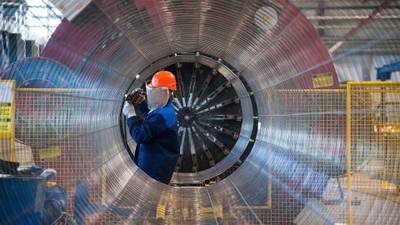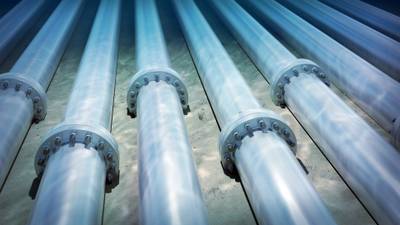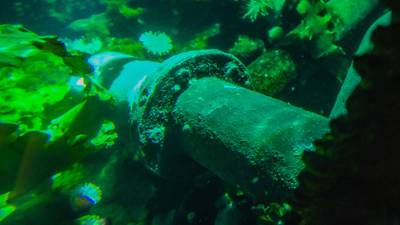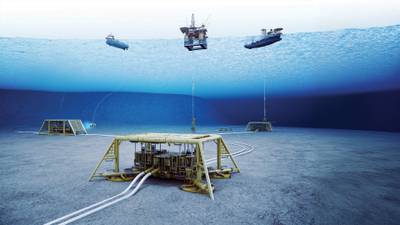Learn to evaluate, test and design a range of riser systems.
Riser systems play a key part in the offshore oil and gas industry. They allow us to bring hydrocarbon from the seabed to the offshore installation.
A core part of our Masters in Subsea Engineering, this course gives you a thorough grounding in riser and mooring design, including the effect of dynamic motions.
Benefit from the expertise of our academics, experienced engineers, and industry specialists, who we bring in to share their knowledge and the latest technological developments with you.
Advance your career as a graduate engineer with a university at the heart of the UK energy sector.
Access our training and support wherever you’re based, with part-time hours to fit around your existing commitments.

Build credits towards a Masters degree
This online course is part of:
You can use the credits you earn on this short course towards any of these MSc qualifications.
What you’ll study
You’ll start the course with an overview of various riser systems, including:
- flexible
- steel catenary
- hybrid
- top-tensioned.
You’ll examine where these systems are applicable, their components, the service life of these components, and the service life of the entire system.
You’ll then explore the fundamentals of ocean hydrodynamics, measuring stresses in the subsea environment and interactions between vessel, mooring and riser systems.
You’ll focus on the hydrodynamic loads on risers. Deriving equations of motion to describe each system, you’ll calculate displacement and stresses to work out how long a riser system will last in different configurations.
You’ll learn how all of this knowledge informs and impacts on riser and mooring design, and discover the latest design trends in riser technologies.
Other important topics you’ll cover include:
- effective tension
- vessel response characterisation
- regular and irregular wave loading analysis
- time and frequency domain solution techniques
- riser ancillary equipment.
By the end of this course, you will understand…
-
Different riser designs and their application.
-
The mechanics of riser systems, and the role of tension, stress, and fatigue.
-
External dynamic forces and their impact on riser and mooring system design.
-
The dynamic motion of floating surface facilities and their consequences for riser design.
-
The methods of riser-installation engineering and planning.
-
The design and application of ancillary riser technology, including interconnectors, joints and buoyancy aids.
-
The latest design trends in riser technologies.
-
The application of riser technologies in deep water.
How you’ll study
Online learning
This distance-learning Riser Systems and Hydrodynamics course is delivered flexibly, 100% online.
You can learn with us anywhere in the world, no student visa required, and manage your study hours to suit you.
Your teaching
This course is taught at Masters level.
Teaching is delivered through MyAberdeen, our online Virtual Learning Environment (VLE). It holds all the materials, tools and support you’ll need in your studies. Take a look around MyAberdeen.
You can access your learning materials on computer, smartphone and laptop, 24 hours a day. You’ll find a range of resources available, including:
- online lectures and tutorials
- reading materials
- discussion boards with your tutors, peers, and professional subsea engineers
- the online resources of our award-winning Sir Duncan Rice Library.
Your tutors
This Masters-level short course is delivered by our School of Engineering.
You’ll learn from highly experienced academics and engineers, alongside experts from industry brought in to share their knowledge and experience with you.
Industry input
Your course content is also developed and reviewed by an Industry Advisory Board. This group of experienced professionals ensures your learning is always informed by the latest industry trends, technology, and career opportunities.
You’ll be assessed online. Assessment will take place throughout the teaching term.
Types of assessment for this course may include:
- coursework
- online quizzes
- timed online open-book assessments.
Assessment deadlines
Your assessments will have submission deadlines, either during or at the end of the course. Your course coordinator will let you know when your assessment deadlines are, so you can plan your study time accordingly.
The course totals approximately 150 hours of study and assessment time. That’s around 10 – 15 hours per week.
This is an indicative guide to the time required for a typical student at this level to achieve the learning outcomes. This includes time for independent study, as well as teaching and assessments.
You can largely set your own study hours each week to cover the materials. MyAberdeen is available 24/7, so you can log in and study when it suits you.
Activities with deadlines
There will be some activities scheduled at fixed times, such as assessments with deadlines, or meetings with your tutor. But otherwise, you can access and work through the course at your convenience.
Our first-class support structure will ensure that you aren’t alone in your studies.
You’ll have contact with your coordinator via email, MyAberdeen, Microsoft Teams, or phone. You can use social media and discussion boards to chat with your fellow students too.
We provide a wide range of services to support you in your studies and beyond:
- Careers and Employability Service
- Disability support
- IT support
- Library support
- Student Support Service – help with finances, wellbeing and non-academic issues
- Student Learning Service – study support, with advice sessions available
- Aberdeen University Students’ Association (AUSA) – run by students for students
- Toolkit – clever apps and free training that can make your study life easier
Wherever you are in the world, you’ll feel part of our very special Aberdeen learning community.
Your course coordinator

Dr Mehmet Kartal
Mehmet is a Reader in Mechanical Engineering in our School of Engineering.
His research interests include micromechanical modelling, contact mechanics, experimental mechanics, and the mechanics of materials.
View Mehmet’s profileWhere this will take you
Towards a Masters
You’ll earn 15 credits at Masters level (SCQF Level 11) with this course. You can use these credits towards our:
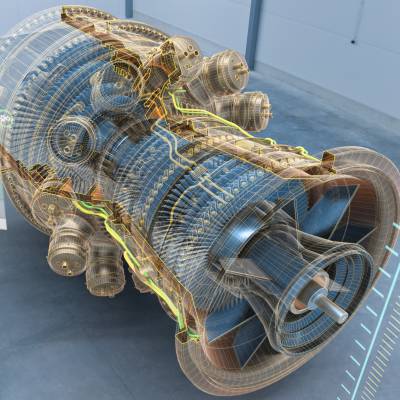
Masters in Advanced Mechanical Engineering
Earn your MSc in Advanced Mechanical Engineering online. Study flexibly and build the advanced skills demanded by the world’s leading employers in the automotive, energy, defence, aerospace, and manufacturing sectors.
View MSc Advanced Mechanical Engineering
Masters in Advanced Structural Engineering
Prepare for a career in the aerospace, automotive, and energy sectors, as well as civil, structural, and construction, with our flexible online Masters degree.
View MSc Advanced Structural Engineering
Accredited Masters in Subsea Engineering
Become a subsea engineer with our accredited online MSc. Train in the fundamental skills and technical knowledge demanded by the subsea sector today.
View MSc Subsea EngineeringBuild your learning
We offer a range of specialist online engineering and technology courses you can use to build your skills.
Many carry credits you can build up into postgraduate qualifications, including Masters degrees:
Careers
This course is designed to develop your career as a graduate engineer already working in, or with ambitions to work in, the subsea engineering sector.
Continuing Professional Development (CPD)
Your employer or professional institute may recognise this course for CPD hours. Talk to your employer or institute to find out more.

Free career support
Access our free careers service while you study.
- 1:1 appointments
- CV checks
- Interview prep
- Job opportunities
Entry requirements
Entry requirements
We welcome students from all over the world.
This course has no formal entry requirements. You do not need to provide proof of your qualifications.
But you do need to check the entry guidance above to understand the level of teaching delivered, to decide if this course is right for you.
If you do not have qualifications from the UK, check the equivalent teaching level for your country.
Visa requirements
You do not need a student visa to study online with us.
English language requirements
Teaching is delivered in English.
You do not have to provide proof of your English language skills to join this course. But we want to make sure that you can use English well enough to study successfully.
Recommended level of English
For this course, we recommend the following level of English language proficiency.
These are our Postgraduate Standard requirements, and these are minimum scores.
IELTS Academic, IELTS UKVI Academic, or IELTS Online (not IELTS Indicator or IELTS General Training)
- 6.5 overall
- 5.5 for listening, reading and speaking
- 6.0 for writing
TOEFL iBT or TOEFL iBT Home Edition
- 90 overall
- 17 for listening
- 18 for reading
- 20 for speaking
- 21 for writing
- TOEFL DI code is 0818
Cambridge English: B2 First, C1 Advanced, or C2 Proficiency
- 176 overall
- 162 for listening, reading and speaking
- 169 for writing
LanguageCert Academic / LanguageCert Academic SELT
- 70 overall
- 60 for listening, reading and speaking
- 65 for writing
Oxford ELLT Digital – English Language Level Test Online
- 7.0 overall
- 5.0 for listening, reading and speaking
- 6.0 for writing
PTE Academic (online test not accepted)
- 62 overall
- 59 for listening, reading, speaking and writing
Skills for English: SELT
- B2 pass with merit
Duolingo – tests taken from 1 July 2024 onward
- 120 overall
- 95 for listening, reading and speaking
- 105 for writing
University of Aberdeen English Pre-sessional Programme (PSE)
- Pass
- Valid for one year. Refresher can be offered if out of date
Pre-sessional academic English preparation programmes undertaken at other UK universities
- Pass at an equivalent of 6.5 (C1)
- B2 in all four skills
- Certification must be within one year prior to the start of your course
For full information about language requirements, see our English Language Requirements page.
You will need access to:
A computer (PC, laptop or Mac) with an up-to-date operating system
Most teaching materials are smartphone- and tablet-friendly. But we recommend a proper laptop or desktop for completing assignments comfortably.
Reliable internet access
We recommend:
- a wired connection
- a minimum download speed of 2 Mbps so you can take part fully in live sessions.
Speakers or headphones
- We recommend a headset with built-in microphone and earphones if you’re likely to study in an environment with background noise.
- A webcam is optional, but you may like to use one for some interactive sessions.
Software
We’ll give you access to Office365 applications. This means you can use online versions of Microsoft Word, Excel, PowerPoint and OneDrive and install these programs on up to five personal devices.
If your course requires specialist software, we’ll provide you with access to this and a licence that lasts throughout your studies.
See our detailed IT requirements for more information.
When you study with us, you can expect a first-class support structure so that you’re never alone in your studies.
But learning online does mean you have to motivate yourself and manage your own time.
Your most important commitment will be time – the time to work through, reflect on and understand your teaching materials.
Before you start a course that involves a high degree of independent study, we recommend looking at the time you will be able to devote to your studies each week:
- Be realistic
- Create a weekly schedule as a guide
If you have any questions about studying online, get in touch with our friendly team. We’re here to help.
Fee payment
Your course fee needs to be paid in full before you start your course.
We accept payment via Visa Debit, Visa Credit and Mastercard.
Ways to save
You may be able to get help funding this course via:
- discounts – if any discounts are available for this course, they’ll appear in the section below
- employer sponsorship – we accept full and partial fee payments from sponsors.
Find out more about funding options.
Student card
All our students are entitled to a University of Aberdeen student card. This gives you access to a range of student discounts around the city and online.
Learning resources
Access to all the essential books and resources you need are included in your tuition fee. They’ll be made available to you online and you do not have to buy your own copies.
We also provide optional recommended reading lists. Many of these resources are available electronically through our library, although purchases may be required if you wish to read the full list.
Printing
You may want to set aside a small budget for printing, depending on how you like to work.
This course has no formal entry requirements. You decide if it’s suitable for you.
The course is delivered at Masters level. For this course, you’d usually have at least:
- 2:1 (upper second class) UK Honours degree, or an Honours degree from a non-UK institution equivalent in any Engineering discipline.
- Key subjects you must have covered: Mathematics, Stress Analysis, Strength of Materials, Dynamics, Fluids and Engineering Design.
Mathematical skills
This course includes significant mathematical content. Please review our mathematical skills document, which we’ve prepared to give you an indication of the level of mathematics you’ll require.

